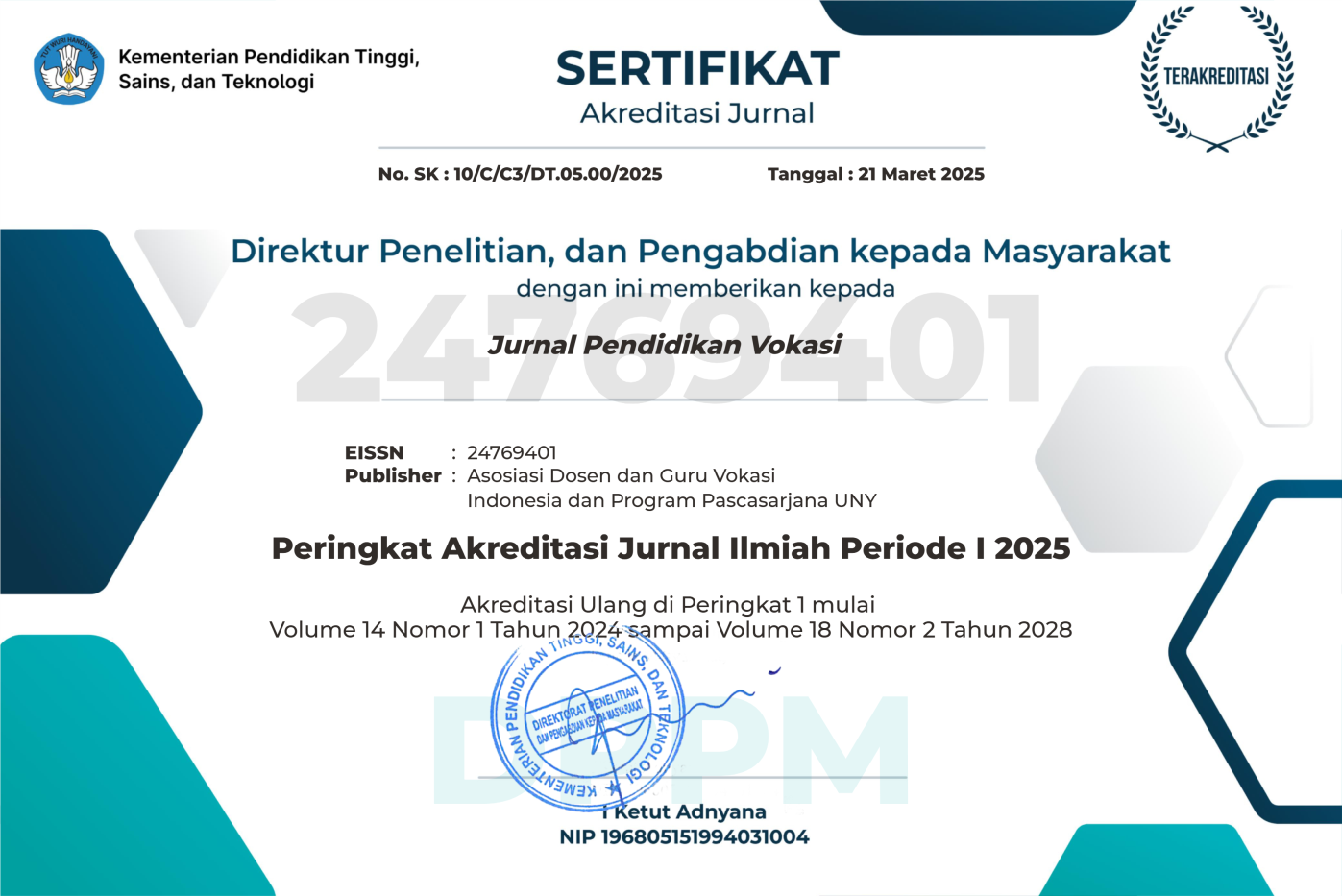An evaluation of students industrial training courses implementation at higher education
DOI:
https://doi.org/10.21831/jpv.v8i3.20775Keywords:
evaluation, implementation, students industrial training course, and studentsAbstract
This article aims to reveal the factual basis regarding the implementation of Students Industrial Training (SIT) course by the bachelor's degree students of Hospitality Management Department from the Faculty of Tourism and Hospitality at the University. The methodology used in this study is mixed method with CSE-UCLA evaluation model. The informants in this study were 35 hospitality management students who were graduated in 2015, the SIT Coordinators, Heads of Tourism Departments, and Supervisors, Managers, Industrial Supervisors, senior staffs, and assistance from the Hotel Food and Beverage department. Data of this research were gathered through observation, questionnaires, and interviews. Those data were analyzed by using descriptive statistics technique. The results showed the average score of the need assessment evaluation component was 4.2 (good), program planning was 4.14 (good), formative evaluation was 4.04 (good), and summative evaluation was 3.98 (enough). This Students Industrial Training Program can be continued by improving the students' knowledge, working skills, and English skills, as well as improving the role of supervisors and instructors/ industrial supervisors in monitoring and providing solutions for the students to overcome problems they faced. Furthermore, this training program needed to improve the quality and quantity of relevant campus facilities and infrastructure to the hospitality industry, and increasing the positive attitude of the students in carrying out the industrial training course.
References
Alkin, M. . C. (1969). Evaluation Theory Development. CSE-UCLA Evaluation Comment, 2(1), 1–11.
Almi, N., Adriani, A., & Idrus, Y. (2013). Pelaksanaan praktek lapangan industri (PLI) pada mahasiswa jurusan kesejahteraan keluarga Fakultas Teknik Universitas Negeri Padang. E-Journal Home Economic and Tourism, 2(1). Retrieved from http://ejournal.unp.ac.id/index.php/jhet/article/view/917
Ananda, R., & Rafida, T. (2017). Pengantar evaluasi program. Medan: Perdana Publishing.
Arikunto, S., & Jabar, C. S. abdul. (2014). Evaluasi Program Pendidikan (2nd ed.). Jakarta: Bumi Aksara.
Ayebo, A., & Assuah, C. (2017). Exploring teachers' knowledge of classroom management and control. Malaysian Journal of Learning and Instruction, 14(1), 169–185.
Coulter, R. (2004). Manajemen (edisi Indonesia) (7th ed.). Jakarta: PT. Indeks Grup Gramedia.
Djojonegoro, W. (1999). Pengembangan sumber daya manusia melalui sekolah menengah kejuruan (SMK). Jakarta: Jaya Gusna Offset.
Lastuti, S., & Jaedun, A. (2014). Evaluasi pelaksanaan program S1 PGSD di Unit Program Belajar Jarak Jauh UT DIY. Jurnal Kependidikan, 44(1). Retrieved from https://journal.uny.ac.id/index.php/jk/article/view/2190
Majid, N. W. A., & Sudira, P. (2017). Proses perolehan kompetensi TIK melalui program praktik industri siswa SMKN 2 Pengasih Kulon Progo. Jurnal Pendidikan Vokasi, 7(1), 14. https://doi.org/10.21831/jpv.v7i1.12712
Miles, M. B., & Huberman, A. M. (2013). Qualitative data analysis. (T. R. Rohidi, Trans.). Jakarta: Universitas Indonesia Press.
Munthe, A. P. (2015). Pentingya evaluasi program di institusi pendidikan: sebuah pengantar, pengertian, tujuan dan manfaat. Scholaria : Jurnal Pendidikan Dan Kebudayaan, 5(2), 1. https://doi.org/10.24246/j.scholaria.2015.v5.i2.p1-14
Pacific Policy Research Center. (2010). 21st century skills for students and teachers. Honolulu: Kamehameha Schools, Research & Evaluation Division.
Presiden Republik Indonesia. Peraturan Pemerintah Republik Indonesia Nomor 39 Tahun 1992 tentang Peranserta Masyarakat Dalam Pendidikan Nasional (1992).
Purwanto, & Suparman, A. (1999). Evaluasi program diklat (program evaluation of training). Jakarta: STIA-LAN Press.
Ravitch, M. S., & Tisdell, E. J. (2016). Qualitative research; a guide to design and implementation. San Fransisco: Jossey-Bass Publishers.
Rossi, P. H., & Freeman, E. H. (1985). Evaluation systematic approach. California: Sage Publications, Inc.
Scriven, M. (2008). The concept of a transdiscipline: and of evaluation as a transdiscipline. Journal of MultiDisciplinary Evaluation, 5(10).
Sudijono, A. (2005). Pengantar evaluasi pendidikan (introduction of education evaluation). Jakarta: PT Raja Grafindo Persada.
Sugiyono. (2011). Metode penelitian kuantitatif, kualitatif dan R & D. Bandung: Alfabeta.
Sukardi, H. M. (2011). Evaluasi pendidikan prinsip & operasionalnya. Yogyakarta: Bumi Aksara.
Suma'mur P.K. (1994). Higene perusahaan dan kesehatan kerja (hygiene of company and occupational health). Jakarta: Haji Masagung.
Tayibnapis, F. Y. (2013). Evaluasi program dan instrumen evaluasi (program evaluation and evaluation instrument). Jakarta: Rineka Cipta.
Unit Hubungan Industri FT UNP. (2013). Buku pedoman pengalaman lapangan industri (PLI) mahasiswa FT UNP (guideline book of industry experience field (PLI) of FT UNP Students). Padang: Unit Hubungan Industri FT UNP.
Utomo, P. (2018). The future orientation for novice teacher induction program in vocational education. Jurnal Pendidikan Vokasi, 8(1), 67. https://doi.org/10.21831/jpv.v8i1.14758
Downloads
Published
How to Cite
Issue
Section
Citation Check
License
The authors submitting a manuscript to this journal agree that, if accepted for publication, copyright publishing of the submission shall be assigned to Jurnal Pendidikan Vokasi. However, even though the journal asks for a copyright transfer, the authors retain (or are granted back) significant scholarly rights.
The copyright transfer agreement form can be downloaded here: [JPV Copyright Transfer Agreement Form]
The copyright form should be signed originally and sent to the Editorial Office through email to jpvokasi@uny.ac.id
Jurnal Pendidikan Vokasi by http://journal.uny.ac.id/index.php/jpv is licensed under a Creative Commons Attribution-ShareAlike 4.0 International License.












